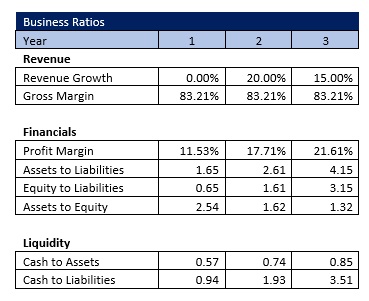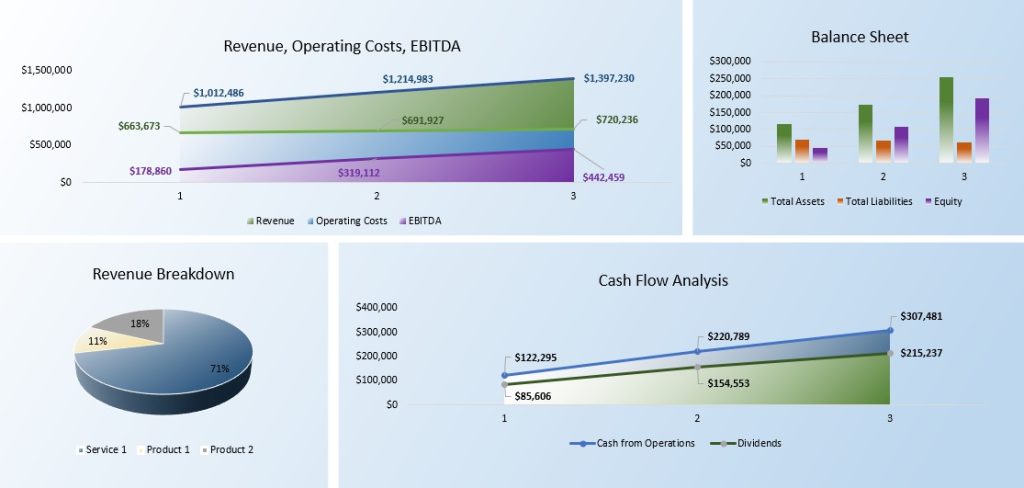
1.0 Executive Summary
The purpose of this business plan is to raise $100,000 for the development of a slaughterhouse while showcasing the expected financials and operations over the next three years. Slaughterhouse, Inc. (“the Company”) is a New York based corporation that will provide for the wholesale slaughter and distribution of meats to retailers. The Company was founded by John Doe.
1.1 Operations
The primary revenue center for the business will come from the ongoing purchase orders of wholesale meat from retailers based in the Company’s target market. The business will earn contribution margins of 70% on each dollar of revenue generated through the wholesale distribution of food through the Company’s sales channels. The business will also earn substantial secondary incomes from ancillary distribution fees and services rendered to customers that operate outside of the Company’s target market radius. The third section of the business plan will further describe the products offered by the Slaughterhouse.
1.2 The Financing
Mr. Doe is seeking to raise $100,000 from as a bank loan. The interest rate and loan agreement are to be further discussed during negotiation. This business plan assumes that the business will receive a 10 year loan with a 9% fixed interest rate. The financing will be used for the following:
• Development of the Company’s Slaughterhouse location.
• Financing for the first six months of operation.
• Capital to purchase the Company’s inventory of livestock. Mr. Doe will contribute $10,000 to the venture.
1.3 Mission Statement
Slaughterhouse’s mission is to become one of the foremost distributors of meat products for retailers within the Company’s targeted markets.
1.4 Management Team
The Company was founded by John Doe. Mr. Doe has more than 10 years of experience in the general distribution industry. Through his expertise, he will be able to bring the operations of the business to profitability within its first year of operations.
1.5 Sales Forecasts
Mr. Doe expects a strong rate of growth at the start of operations. Below are the expected financials over the next three years.
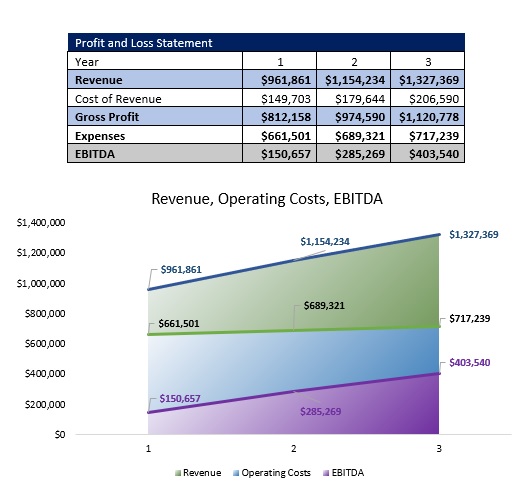
1.6 Expansion Plan
The Founder expects that the business will aggressively expand during the first three years of operation. Mr. Doe intends to implement marketing campaigns that will effectively target retail locations within the target market.
2.0 Company and Financing Summary
2.1 Registered Name and Corporate Structure
Slaughterhouse, Inc. The Company is registered as a corporation in the State of New York.
2.2 Required Funds
At this time, the Slaughterhouse requires $100,000 of debt funds. Below is a breakdown of how these funds will be used:
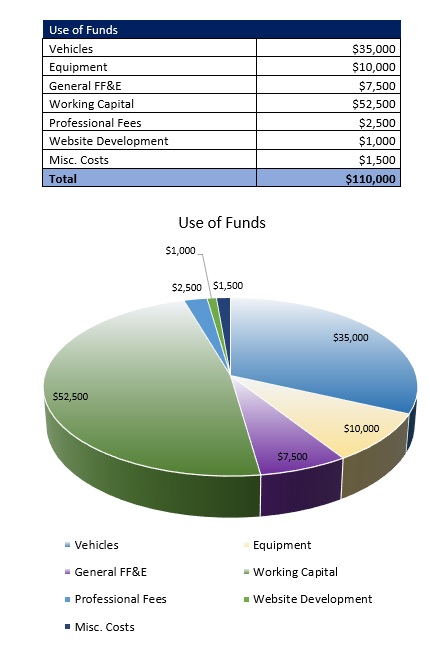
2.3 Investor Equity
Mr. Doe is not seeking an investment from a third party at this time.
2.4 Management Equity
John Doe owns 100% of the Slaughterhouse, Inc.
2.5 Exit Strategy
If the business is very successful, Mr. Doe may seek to sell the business to a third party for a significant earnings multiple. Most likely, the Company will hire a qualified business broker to sell the business on behalf of the Slaughterhouse. Based on historical numbers, the business could fetch a sales premium of up to 4 times earnings.
3.0 Operations
Below is a description of the products offered by the Slaughterhouse.
3.1 Wholesale Meat Products
Management is currently in the process of sourcing a number of companies that produce and market meats for selected retail stores. The business intends to offer a broad selection of fresh meats that are directly slaughtered by the business in its facilities. Management anticipates that the Company will be able to mark-up our purchased inventory 65% of its actual cost.
4.0 Strategic and Market Analysis
4.1 Economic Outlook
This section of the analysis will detail the economic climate, the wholesale food and slaughterhouse industry, the customer profile, and the competition that the business will face as it progresses through its business operations.
Currently, the economic climate is moderate. The economy is undergoing a transition period due to changes in global trade policy. At this time, interest rates have remained steady due to appropriate and measured policies by central banks. While there has been volatility, this is expected to subside as the economy adapts to these changes.
However, most meat in the US is produced domestically. The business will be able to achieve significant growth over the next three years given the ongoing demand.
4.2 Industry Analysis
Within the United States, there are more than 15,000 companies that specialize in the wholesale distribution of meat (either as a slaughterhouse or as a distributor) to retail locations (including supermarkets) that generate more than more than $200 billion per year. The employs more than one million Americans and annual payrolls of $9 billion year. This industry is mature and the expected growth rate of the industry is expected to remain on par with the general economic growth of the United States as well as the annual growth in population. There is currently no legislation or other issues pending that are expected to impede the continued growth of the industry.
4.3 Customer Profile
Slaughterhouse’s average end user will be a retail food seller operating within the Company’s target market. Common traits among clients will include:
• Annual revenues exceeding $1,000,000 per year
• Will spend $2,500 to $10,000 per month with the Company.
• Operates within 15 to 25 miles of the Company’s operational radius.
4.4 Competitive Analysis
This is one of the sections of the business plan that you must write completely on your own. The key to writing a strong competitive analysis is that you do your research on the local competition. Find out who your competitors are by searching online directories and searching in your local Yellow Pages. If there are a number of competitors in the same industry (meaning that it is not feasible to describe each one) then showcase the number of businesses that compete with you, and why your business will provide customers with service/products that are of better quality or less expensive than your competition.
5.0 Marketing Plan
The Slaughterhouse intends to maintain an extensive marketing campaign that will ensure maximum visibility for the business in its targeted market. Below is an overview of the marketing strategies and objectives of the Slaughterhouse.
5.1 Marketing Objectives
- Implement a local campaign with the Company’s targeted market that will connect the business to retailers.
- Develop an online presence by developing a website and placing the Company’s name and contact information with online directories.
5.2 Marketing Strategies
Mr. Doe intends on using a number of marketing strategies that will allow the Slaughterhouse to easily target retail stores within the target market. These strategies include traditional print advertisements and ads placed on search engines on the Internet. Below is a description of how the business intends to market its products to retail locations. The Slaughterhouse will also use an internet based strategy. This is very important as many people seeking local products, such as slaughterhouses, now the Internet to conduct their preliminary searches. Mr. Doe will register the Company with online portals so that potential retail customers can easily reach the business. The Company will also develop its own online website. The Company will maintain a sizable amount of print and traditional advertising methods within local markets to promote the wholesale meat products that the Company is selling.
6.0 Organizational Plan and Personnel Summary
6.1 Corporate Organization

6.2 Organizational Budget

7.0 Financial Plan
7.1 Underlying Assumptions
- The Slaughterhouse will have an annual revenue growth rate of 16% per year.
- The Owner will acquire $100,000 of debt funds to develop the business.
- The loan will have a 10 year term with a 9% interest rate.
7.2 Sensitivity Analysis
In the event of a more severe economic downturn, the business may have a decline in its revenues. However, the high gross margins generated by the business will ensure that the business will maintain profitability despite deleterious economic conditions.
7.3 Source of Funds

7.4 General Assumptions

7.5 Profit and Loss Statement
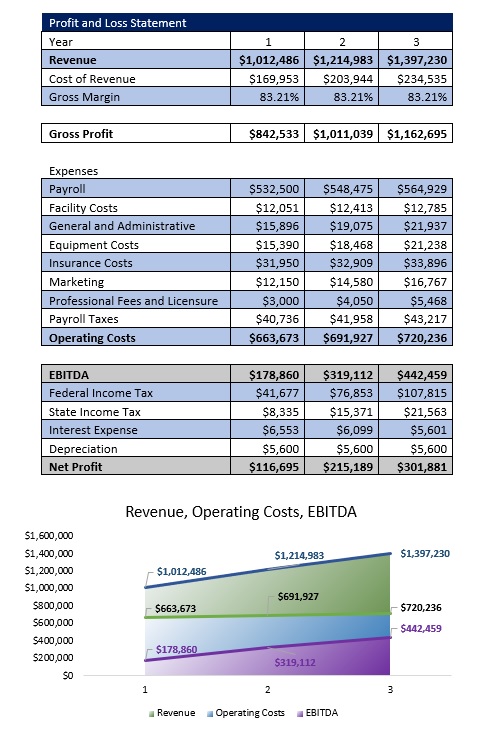
7.6 Cash Flow Analysis
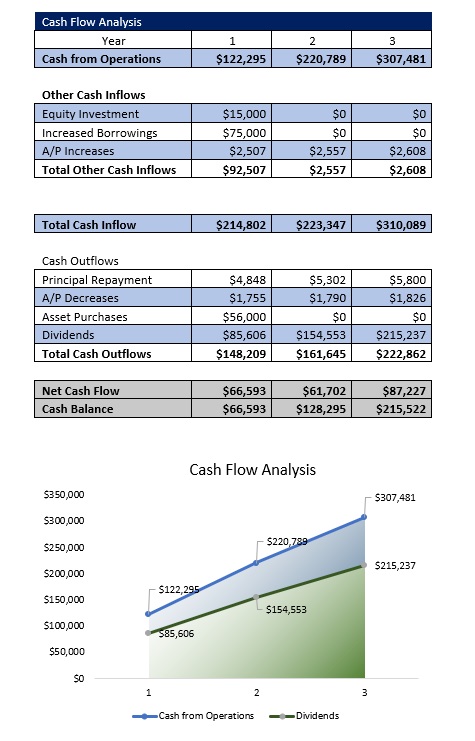
7.7 Balance Sheet

7.8 Breakeven Analysis
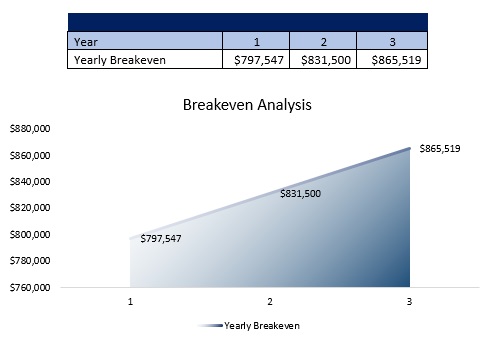
7.9 Business Ratios
